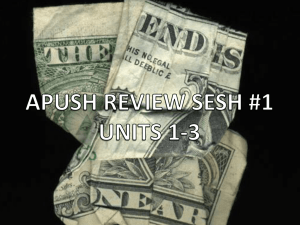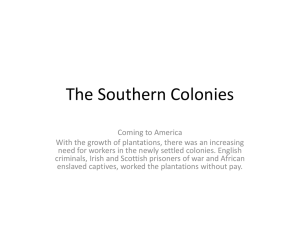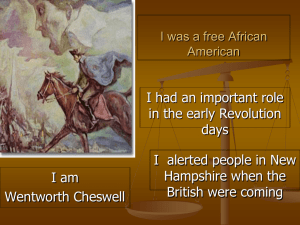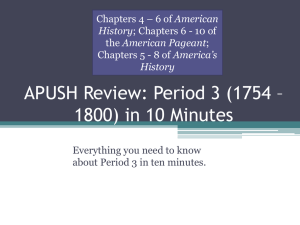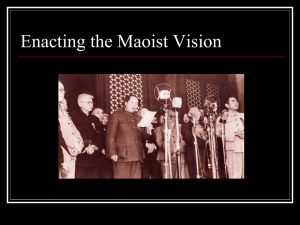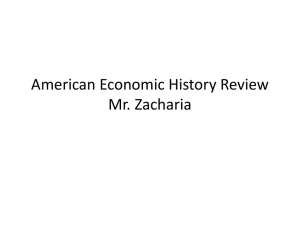APUSH History Review
advertisement
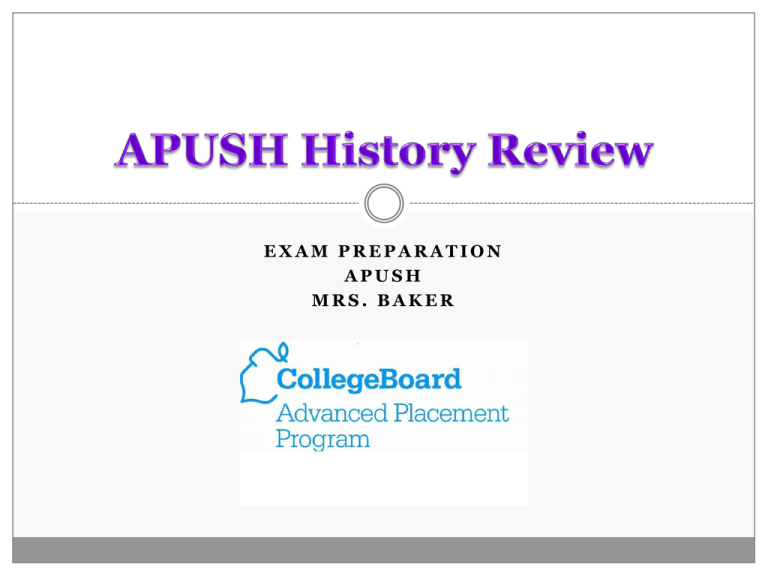
EXAM PREPARATION APUSH MRS. BAKER Overview of the Exam Designed to evaluate the knowledge, understanding, and thinking and writing skills that would be demonstrated in a year-long introductory-level college course in U.S. History. Combination of factual knowledge and ability to analyze historical questions in a critical manner is the major key to success of the exam. The Exam 3 hours and 5 minutes Consists of 2 sections – Multiple Choice – (50%) 80 questions 55 minutes Free Response –(50%) Part A: 1 DBQ – (22.5%) 60 minutes Part B: 2 Standard essay questions – (22.5%) 70 minutes (35 each essay) Section 1: Multiple Choice Breakdown of questions: Pre-Columbian to 1789 – 20% 1790 to 1914 – 45% 1915 to present – 35% Expect only a few questions from the period after the early 1980s. And even fewer from the past 10 years. Theme breakdown: Political institutions, behavior, and public policy – 35% Social change, cultural and intellectual developments – 40% Diplomacy and international relations – 15% Economic developments – 10% Section 2: The Essays (3) Total section time – 130 minutes DBQ time breakdown Read the document-based questions – 15 min. (mandatory) Written response – 45 min. (advised) FRQ time breakdown Part B – to 1865 Plan essay 1 – 5 min. (advised) Written response – 30 min. (advised) Part C – after 1865 Plan essay 1 – 5 min. (advised) Written response – 30 min. (advised) 1492 - 1700 Major Themes The differences between the Southern, New England, and Middle colonies Characteristics of the Puritan experience “City Upon a Hill” Origins of Slavery Indentured servitude and its role in the colonial economy The slow evolution from separate colonies to unify by 1763 Economic and political relations between Great Britain and the colonies to 1763 Impact of the colonial wars on the colonies on their relationship with Britain Mercantilism and the colonies Terms to Know Jamestown Anne Hutchinson Captain John Smith Quakers Plymouth Colony William Penn Pilgrims Mercantilism Puritans Navigation Acts Mayflower Compact MA Bay Colony Triangle Trade John Winthrop Halfway Covenant “City Upon a Hill” First Great Awakening VA House of Burgesses Jonathon Edwards Proprietorship Salem Witch Trials George Calvert John Peter Zenger Maryland Act of Toleration (1649) French & Indian War (1756 – 1763) Bacon’s Rebellion Albany Plan of Union Headright System Treaty of Paris (1763) Indentured Servitude Salutary Neglect Roger Williams Important Dates: Foundations of America Southern Colonies Northern Colonies 1585 – Raleigh founds “Lost Colony” at Roanoke 1620 – Pilgrims sail on the Mayflower to Plymouth Bay 1607 – Virginia Colony founded at Jamestown 1624 – Dutch found New Netherland 1612 – Rolfe perfects tobacco culture 1630 – Puritans found Massachusetts Bay Colony 1635 – 1636 – Roger Williams convicted of heresy and found Rhode Island colony 1635 – 1638 – Connecticut and New Haven colonies founded 1638 – Anne Hutchinson banished from Massachusetts colony 1639 – Connecticut Fundamental Orders drafted 1664 - England seizes New Netherland from Dutch 1681 – William Penn founds Pennsylvania colony 1619 – First Africans arrive in Jamestown Virginia House of Burgesses established 1624 – Virginia becomes royal colony 1634 – Maryland founded 1670 – Carolina colony created 1712 – North Carolina formally separates from South Carolina 1733 – Georgia colony founded Important Dates: Social Changes 1693 – College of William and Mary founded 1701 – Yale College founded 1734 – Jonathon Edwards begins Great Awakening 1734 – 1735 – Zenger free-press trial in New York 1738 – George Whitefield spreads Great Awakening 1746 – Princeton College founded Important Dates: French and English Colonies Collide 1608 – Champlain colonizes Quebec for France 1682 – La Salle explores the Mississippi River to the Gulf of Mexico 1689 – 1697 – King William’s War 1702 – 1713 – Queen Anne’s War 1718 – French found New Orleans 1744 – 1748 – King George’s War 1754 – Washington battles French on frontier 1754 – 1763 – Seven Year’s War Albany Congress French and Indian War 1763 – Treaty of Paris Pontiac’s uprising Proclamation of 1763 Columbian Exchange 1763 - 1783 Major Themes The short- and long-term causes of the American Revolution Colonial assemblies as leaders against Great Britain The Revolution was formed by changes in British colonial policy in the 1763-1776 period The Revolution was brought on by tight economic controls and loose political controls. The ideas/ideals expressed in the Declaration of Independence. Several different interpretations by historians on the causes of the American Revolution. Was the Treaty of Paris (1783) a victory for the U. S.? How had the 13 separate colonies become similar by the time of the Revolution? The American Revolution as a democratic revolution turned into an aristocratic government by the Constitution. The American Revolution as a question of home rule and who should rule at home. The American Revolution as a revolutionary event --> consider the economic and social changes associated with the Revolution. Was the Revolution avoidable? Terms to Know Proclamation of 1763 Intolerable [Coercive] Acts (1774) Sugar Act (1764) Quebec Act (1774) Virtual representation First Continental Congress (1774) Stamp Act (1765) Articles of Confederation Quartering Act (1765) Second Continental Congress (1775) Virginia Resolves Common Sense Stamp Act Congress Lexington & Concord Sons of Liberty Olive Branch Petition Writs of assistance Saratoga French Alliance of 1778 Loyalists (Tories) Yorktown (1781) Treaty of Paris (1783) Declaratory Act (1766) Townshend Acts (1767) Sam Adams Boston Massacre (1770) Patrick Henry John Dickinson Committees of Correspondence Boston Tea Party (1773) Important Dates: Causes of the American Revolution 1650 – First Navigation Laws to control colonial commerce 1763 – Seven Year’s War 1764 – Sugar Act 1768 – British troops occupy Boston 1770 – Boston Massacre 1772 – Committees of correspondence formed 1773 – British East India Company granted tea monopoly 1765 – Quartering Act Stamp Act Stamp Act Congress 1766 – Declaratory Act 1767 – Townshend Acts All Townshend Acts except tea tax repealed 1774 – “Intolerable Acts” Boston Tea Party Quebec Act First Continental Congress 1775 – Battle of Lexington and Concord Important Dates: American Revolution 1775 – Battles of Lexington & Concord 1778 – Formation of the French- American alliance Second Continental Congress Battle of Bunker Hill King George III formally proclaims colonies in rebellion Failed invasion of Canada 1776 – Paine’s Common Sense Declaration of Independence Battle of Trenton 1777 – Battle of Saratoga Battle of Saratoga 1781 – French and Americans force Cornwallis to surrender at Yorktown 1783 – Treaty of Paris British American Colonies 1776 - 1800 Major Themes Enlightenment concepts and the Constitution. How critical was the “Critical Period”? Compare and contrast the Declaration of Independence, the Articles of Confederation, and the Constitution. Origins of the ideas of separation of powers, written constitutions, and federalism. Areas of agreement at the Constitutional Convention. Bill of Rights: provisions and meanings. Slavery and the Constitution. Failures of the Constitution led to the evolution of political parties. Liberty versus law and order in the 1790s. Hamilton’s economic program. Thomas Jefferson versus Alexander Hamilton. Differences between the Democratic-Republicans and the Federalists. Compare 1763-1776 with 1783-1800 in regard to the relationship between the central government and the colonies or states. Significance of these election years: 1796 & 1800. The “Revolution” of 1800. Loose versus strict construction as a matter of sectional or political interest. The significance of George Washington’s “Farewell Address”. Key Terms Articles of Confederation Shay’s Rebellion Annapolis Convention Judiciary Act (1789) Report on Public Credit (1790) Northwest Ordinance of 1787 Report on Manufactures (1791) Philadelphia Convention (1787) “Citizen” Genet James Madison Alexander Hamilton Jay Treaty (1794) Virginia Plan Whiskey Rebellion (1794) New Jersey Plan Connecticut Plan Washington’s “Farewell Address” (1796) 3/5s Compromise Democratic-Republican Party Federalists XYZ Affair Anti-Federalists Strict constructionist Alien & Sedition Acts (1798) Loose constructionist KY & VA Resolutions (1799) Federalist Papers (esp. #10) Revolution of 1800 1800 – 1824 THOMAS JEFFERSON JAMES MADISON JAMES MONROE Major Themes Decline and death of the Federalist Party. “Era of Good Feeling”. Marshall and his Supreme Court decisions. What caused Jeffersonian Democracy to develop? Compare the Second Party System with the First. Rise and development of political parties --> economic, social, and geographical characteristics and leaders. Hamilton’s economic program created the political issues for the next 50 years. The positions, rationale, issues, and spokesmen for the sections on the following political topics: tariff, banking, internal improvements, expansion, and slavery. The significance of the 1824 election. The War of 1812 as a second War for Independence. Foreign policy united and divided Americans between 1800 and 1824. The interests of the West were satisfied by neither the Jeffersonian nor the Federalists between 1789 and 1815. Provisions and impact of the Monroe Doctrine. Clay’s “American System”. Key Terms Louisiana Purchase War of 1812 Lewis & Clark Impressment Judiciary Act (1801) Hartford Convention (1814) “Midnight Judges” Treaty of Ghent (1814) Judicial review Battle of New Orleans John Marshall “Era of Good Feeling” Marbury v. Madison (1803) Tariff of 1816 Fletcher v. Peck (1810) Rush-Bagot Agreement (1817) McCulloch v. Maryland (1819) Adams-Onis Treaty (1819) Dartmouth College v. Woodward (1819) Cohens v. Virginia (1821) Panic of 1819 Gibbons v. Ogden (1824) Missouri Compromise of 1820 Aaron Burr Monroe Doctrine (1823) Embargo Act (1807) Erie Canal Macon’s Bill #2 (1810) Robert Fulton War Hawks Eli Whitney John C. Calhoun (SC) Lowell System Henry Clay (KY) Denmark Vessey (1822) The Age of Jackson 1824 – 1840 JOHN QUINCY ADAMS ANDREW JACKSON MARTIN VAN BUREN Antebellum Reform Westward Expansion & Sectionalism 1830S – 1860 WILLIAM H. HARRISON JOHN TYLER JAMES K. POLK ZACHARY TAYLOR MILLARD FILLMORE FRANKLIN PIERCE JAMES BUCHANAN The American Civil War & Reconstruction 1860 – 1877 ABRAHAM LINCOLN ANDREW JOHNSON ULYSSES S. GRANT RUTHERFORD B. HAYES Closing the Frontier & The New South The Gilded Age JAMES GARFIELD CHESTER ARTHUR GROVER CLEVELAND BENJAMIN HARRISON GROVER CLEVELAND WILLIAM MCKINLEY American Imperialism WILLIAM MCKINLEY THEODORE ROOSEVELT WILLIAM HOWARD TAFT WOODROW WILSON
